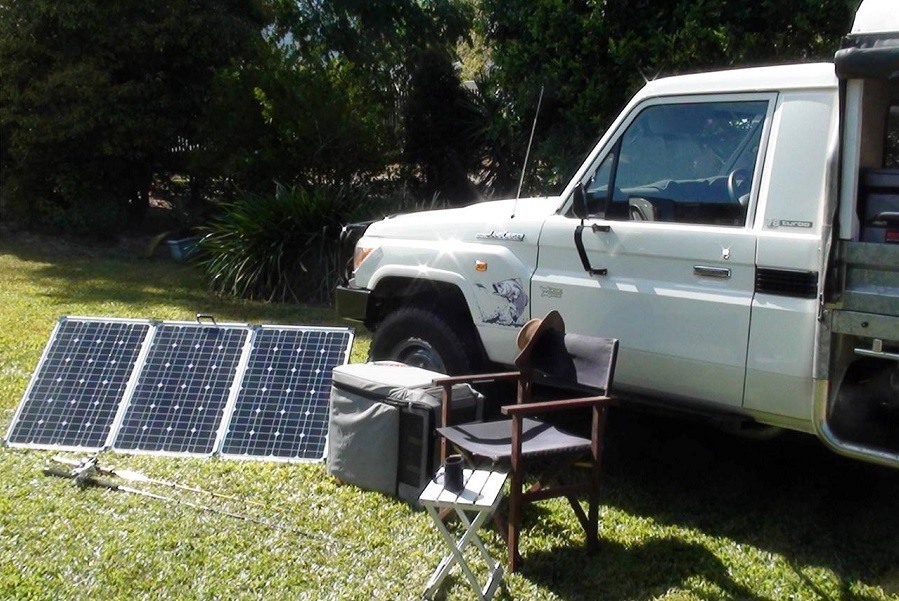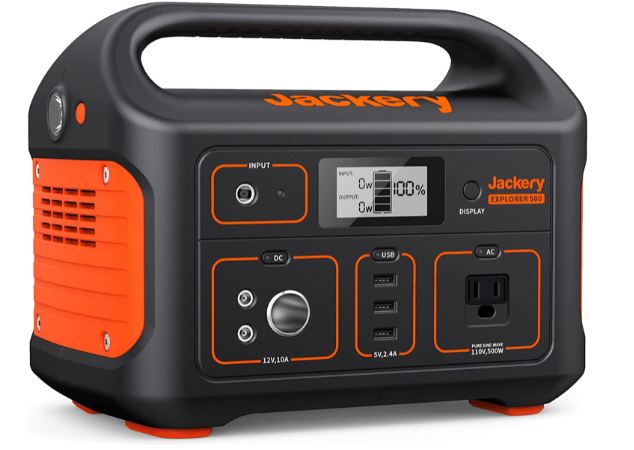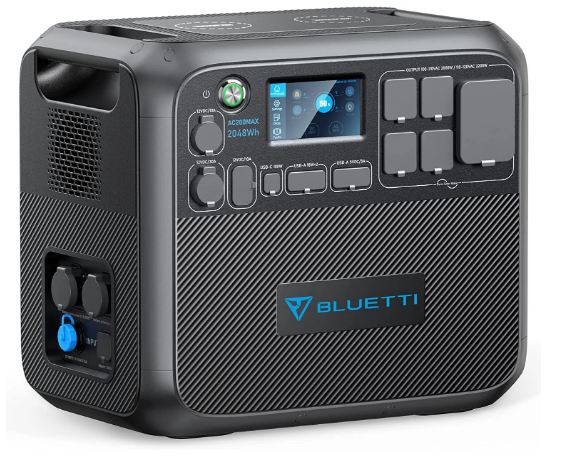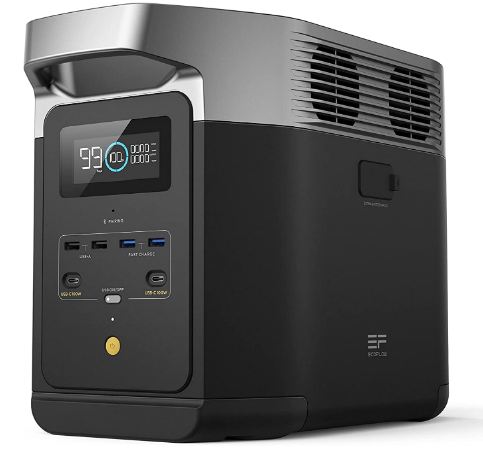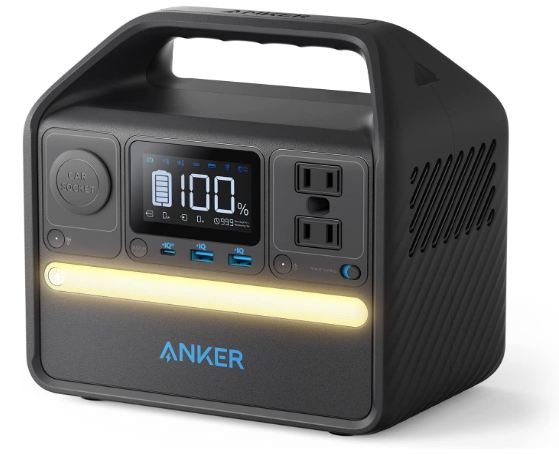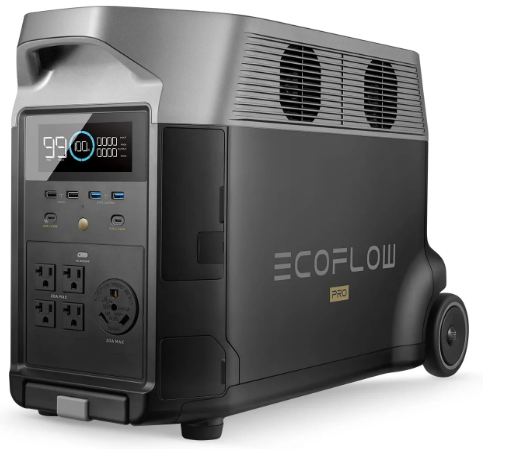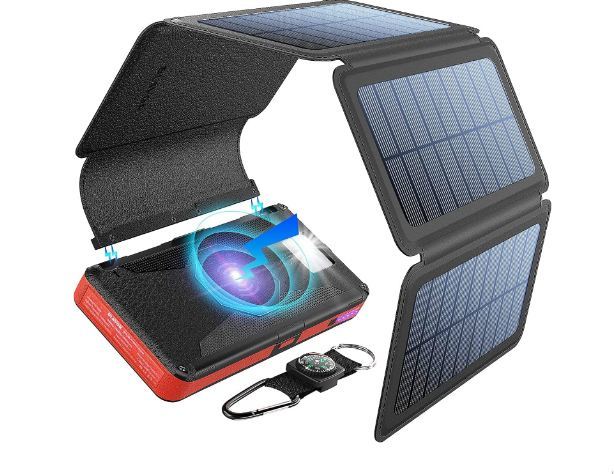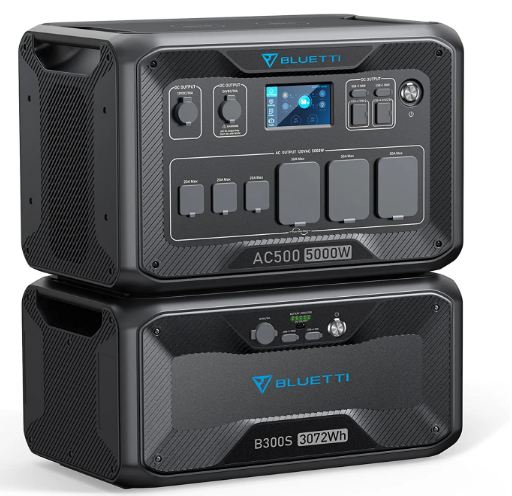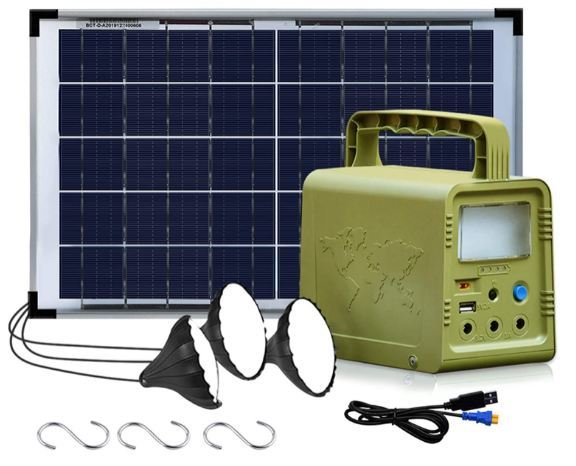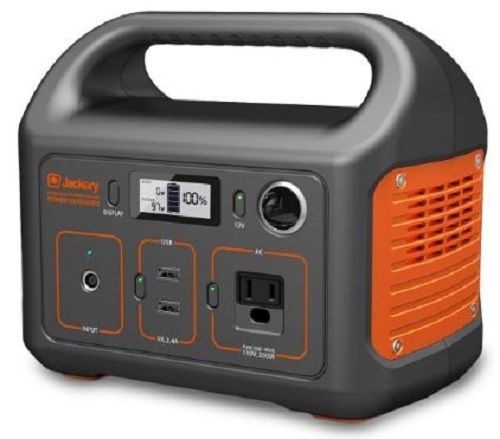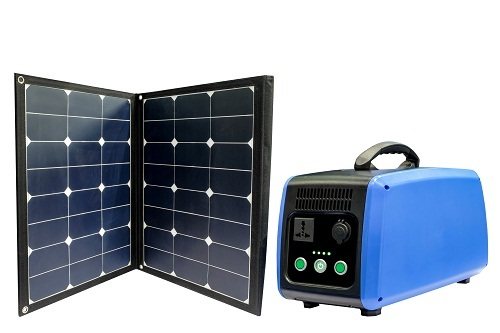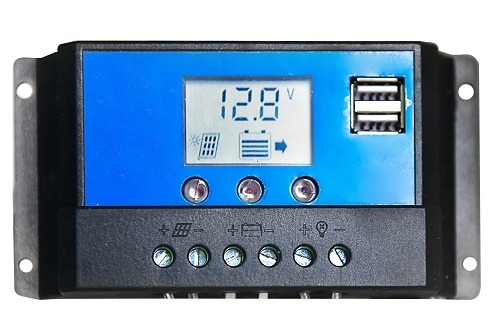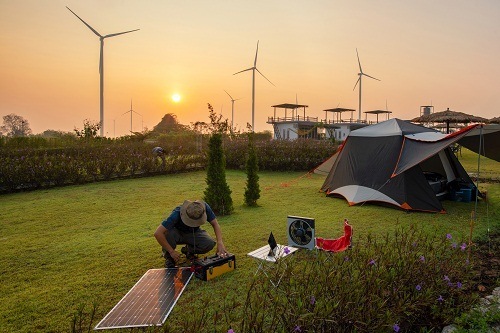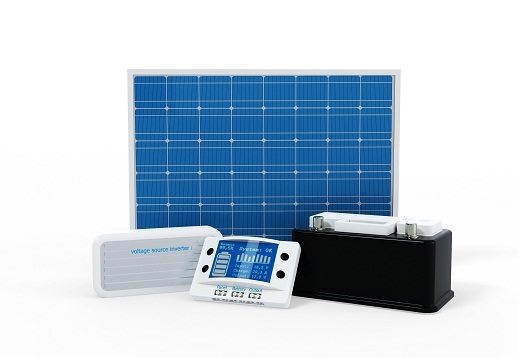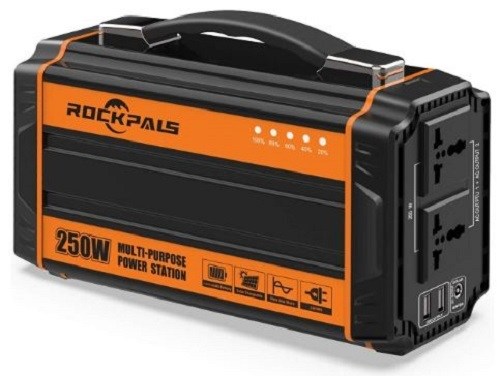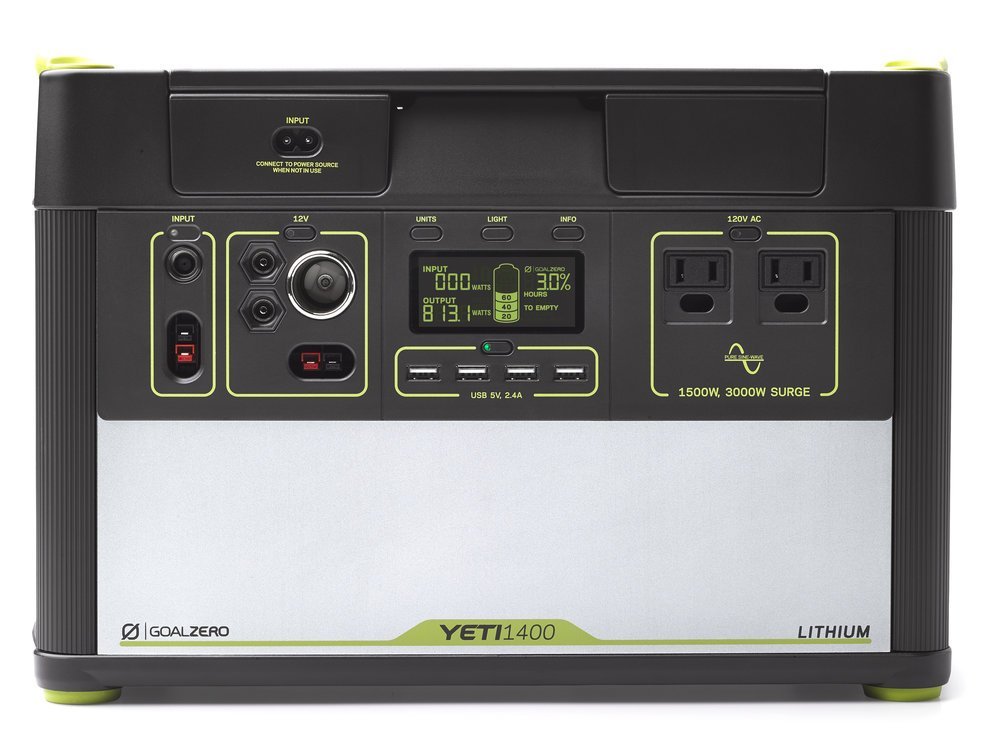Sleeping under the stars with your phone on full bars is no longer a dream, thanks to affordable, quiet and clean off-grid solar generators.
Outdoor activities like hiking, camping, boating, and RV travel are more popular today than ever before.
In the past, bringing anything with you that was powered by electricity - cell phones, radios, fans, laptops - meant choosing one of two options: lugging along a loud, smelly gas generator with extra cans of fuel; or, sleeping in a marina, camp or RV site near available power outlets.
Using any of the solar generators reviewed on this page, outdoor lovers can now sleep anywhere they want and stay in touch with the world outside.
While you're out playing, the solar panels at the campsite convert the sun's rays into a clean and green power supply.
When you get back in the evening, these perfectly quiet power sources are ready again to recharge your electronics, power the camp lights and even power appliances you don't want to travel without.
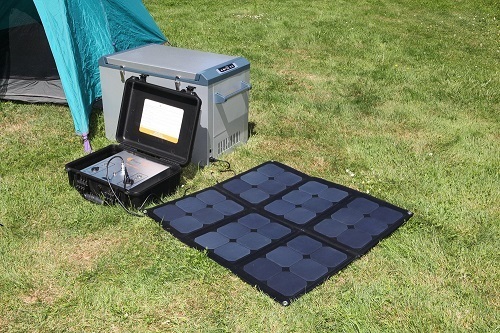
The silent convenience provided by solar generators is really unparalleled.
Solar generators are completely silent, don't emit smelly & dangerous exhaust fumes, are renewable & green, and are perfectly capable of powering your essential devices.
Think about it: no more worry about running your vehicle's batteries down, hunting for plug-ins, or watching helplessly as your laptop powers off while you drive around, looking for a place to plug it in.
Solar generators come in many shapes and sizes, from single-device backups to permanently installed units that are strictly for home use.
This guide details six of the best solar generators for camping, boating, and RV use. We've selected a couple of choices in each power rating.
Some of these solar generators are only useful for recharging a laptop and a phone.
Others are brutes that can power your refrigerator and a TV.
To figure out how many watts of power you'll need on the road, use our appliance wattage guide.
Best Solar Generators For Boating, Camping and RVs: Comparison Table
- 1Best for Camping: Jackery Explorer 500 Portable Power
- 2Best for Boats, RVs, and Vans : Bluetti AC200MAX
- 3Best for Devices & Small Appliances: Bluetti EB3A
- 4Best For Larger Appliances: EcoFlow Delta 2
- 5Best Lightweight: Anker 521
- 6Best With an RV Port: EcoFlow Delta Pro
- 7Best Solar Power Bank: Blavor PN-W09 Solar Charger
- 8Best For Large Boats, RVs and Motorhomes: Bluetti AC500 + B300S
- 9Best Solar Generator Lighting Kit: ECO-WORTHY 84Wh Portable Power Station
- 10Best Budget Buy: Jackery Explorer 240
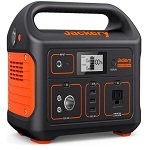
Jackery Explorer 500
- Best for camping
518Wh Li-ion battery
500W output
Outlets:
AC, 12V DC, 6.5mm DC, USB-A100W solar input
100W AC input
13.3lbs
2yr warranty
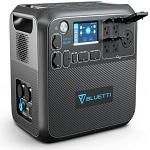
Bluetti AC200MAX
- Best for RVs, boats & vans
2048Wh LiFePO4 battery
2200W output
Outlets:
AC, 30A RV AC & DC, 5.5mm DC, 12V DC, USB-A, USB-C, wireless900W solar input
400W AC input
61.9lbs
2yr warranty
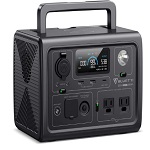
Bluetti EB3A
- Best for devices & small appliances
268Wh LiFePO4 battery
600W output
Outlets:
AC, 12V DC, 5.5mm DC, USB-A, USB-C, wireless200W solar input
430W AC input
10.1lbs
2yr warranty
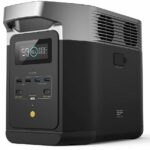
EcoFlow Delta 2
- Best for larger appliances
1024Wh LiFePO4 battery
1800W output
Outlets:
AC, 12V DC, 5.5mm DC, USB-A, USB-C500W solar input
1200W AC input
26.4lbs
5yr warranty
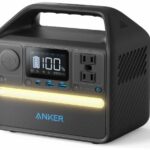
Anker 521
- Best lightweight
256Wh LiFePO4 battery
200W output
Outlets:
AC, 12V DC, USB-A, USB-C65W solar input
65W AC input
8.2lbs
5yr warranty
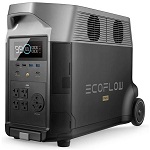
EcoFlow Delta Pro
- Best with RV port
3600Wh LiFePO4 battery
3600W output
Outlets:
AC, 30A AC, DC RV port, 12V DC, 5.5mm DC, USB-A, USB-Cs1600W solar input
1800W AC input
99lbs
5yr warranty
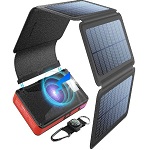
Blavor PN-W09
- Best solar power bank
74Wh Li-Po battery
No AC output
Outlets:
USB-A, wireless6.5W solar output
N/A
1.25lbs
3yr warranty
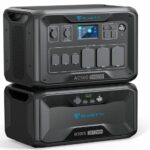
Bluetti AC500 + B300S
- Best for large boats & RVs
3072Wh LiFePO4 battery
5000W AC output
Outlets:
AC, AC & DC RV ports, USB-A, USB-C, wireless3000W solar input
4500W AC input
150lbs
4yr warranty
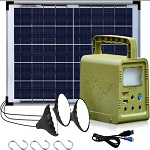
Eco-Worthy
- Best lighting kit
84Wh Li-ion battery
No AC output
Outlets:
USB, DC18W solar input
N/A
2.1lbs
2yr warranty
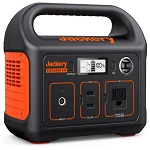
Jakery Explorer 240
- Best budget
240Wh Li-ion battery
200W AC output
Outlets:
AC, USB-A, 12V DC65W solar input
65W AC input
6.6lbs
2yr warranty
1. Best for Camping: Jackery Explorer 500 Portable Power Station
For camping, you want a solar generator that is lightweight yet capable. The Jackery Explorer 500 meets both those needs.
It’s small, light, and can power most of the devices and small appliances used while camping.
Pros
Cons
Our Review
The Jackery Explorer 500 hits the right balance between portability and capability.
It’s compact and lightweight, yet has a decently sized battery and inverter for most people’s camping needs.
Capacity
The lithium battery inside the Explorer 500 has a capacity of 518Wh.
That’s plenty of power to charge devices and power a couple of small appliances for a few hours. It can charge a smartphone 53 times, a laptop almost 5 times, and a mini fridge for 9 hours.
Multiple Outlets
The Explorer 500 comes with USB, DC, and AC outlets so you can plug in all kinds of electronics.
The AC inverter puts out power through a single AC outlet with a max rating of 500W.
For your devices and gadgets, there are three 5V USB-A ports. And for your DC-powered appliances and tools such as car fridges and CPAP, use the two DC 6.5mm outlets or the 12V DC car port.
Three Ways to Recharge
You can recharge the Explorer 500 from a wall outlet using the included AC adapter. It’ll take about 7.5 hours.
When you are on the road or outdoors, you can recharge from a solar panel (takes about 9.5hrs with a 100W panel) or from your vehicle (takes about 16 hours).
Issues & Limitations
The Jackery Explorer is just about perfect for campers except for a couple of issues.
One, there’s no USB-C or quick charge port, options available in many modern solar generators. You can buy adapters to convert from USB-A to USB-C but having these ports would be more convenient.
The other complaint from customers is that Jackery uses non-standard 6.5mm DC ports. It’s hard to find cables for these ports (standard ports are 5.5mm).
Many customers have resorted to buying adapters like this 5.5mm to 6.5mm converter from Walmart.
Summary
The Jackery Explorer 500 is a great choice for campers looking for a lightweight and compact solar generator that can charge their devices and power small appliances.
Avoid it if you need a power station just for recharging your devices and powering a single small appliance like a CPAP or mini fridge. Get the Rockpals 250-Watt portable generator instead (reviewed further below).
2. Best for Boats, RVs, and Vans: Bluetti AC200MAX
The large capacity and high power output of the Bluetti AC200MAX makes it a great choice for powering appliances in RVs, boats and vans.
The AC200MAX comes with DC and AC RV ports for easy hook up to your power system.
Pros
Cons
Our Review
Expandable Capacity
The Bluetti AC200MAX comes with a 2048Wh battery. That’s plenty of capacity for most RVs and boats to supplement your existing battery bank, and it’s probably enough to run an entire camper van on its own.
But don't worry if you later realize it’s not enough; you can easily expand the AC200MAX with extra batteries.
You can add up to two B300 batteries to get 8192Wh total capacity or two B230 batteries to get 6144Wh total capacity.
If you want, you can ditch the traditional RV battery bank and rely on just the AC200MAX solar generator.
By the way, the AC200MAX uses LiFePO4 batteries, which are the best for RVs and boats. They last a hack of a long time, even with daily use.
High Output
Looking for a solar generator that can run appliances? The AC200MAX is up to the task with its built-in 2200W pure sine wave inverter.
It can run most large appliances and power multiple smaller appliances at the same time.
What Can The Bluetti AC200MAX Power?
Refrigerator (120W) | 14.5 hrs |
Mini fridge (60W) | 29 hrs |
Water purifier (30W) | 35.7 hrs |
Laptop (60Wh) | 29 recharges |
Smartphone (12Wh) | 145 recharges |
Fan (100W) | 10.7 hrs |
Microwave (1000W) | 1 hr |
Multiple Outlets Including Shore Power Ports
One of the things we love about using the AC200MAX in an RV or boat is that you don’t need to do any complicated wiring to power your entire RV using the solar generator.
That’s because the AC200MAX comes ready with two RV outlets. There’s a 120V/30A outlet for your AC power and a 12V/30A outlet for your DC system.
All you need to do is plug your RV’s or boat’s 30A power cord or Anderson connector into the AC200MAX. If you have a 50A plug instead, just get a 30A adapter.
You can also connect appliances, tools and gadgets directly to the AC200MAX. It has four AC outlets, two DC5521 ports, one 12V car outlet, one 100W USB-C port, four USB-A ports and two 15W wireless charging pads.
Fast Solar Charging
If you’ll be using solar panels to recharge the AC200MAX, the good news is that it charges fairly fast.
The built-in MPPT charge controller accepts up to 900W of solar input (10-145V). If you max out your solar array, you can fully recharge the AC200MAX in under 4 hours if it’s sunny.
And even if it’s a bit cloudy, you can still recharge the solar generator before the end of the day, ensuring you have enough power for nighttime.
You can also recharge the AC200MAX from a wall outlet. AC input is 500W, which takes about 6 hours to recharge the battery.
For faster charging, combine solar and AC to get a max input of 1400W (2-2.5hr recharge time).
Other recharge options include dual AC chargers (3-3.5 hrs) and your vehicle’s 12V/24V outlet (10-20 hrs).
Issues & Limitations
A Bit Heavy
At 61.9lbs, the Bluetti AC200MAX is a bit heavy for a 2kWh solar generator. That’s because of the lithium-phosphate battery, which has lower energy density compared to the lighter li-ion batteries.
If you need a versatile solar generator you can use in your RV, when camping, on picnics and at home, consider getting something lighter and easier to carry around.
But if you plan to use the solar generator mostly in your RV, van or boat, then the weight of the AC200MAX is not an issue.
Slow AC Charging
Another issue with the Bluetti AC200MAX is that it charges relatively slowly from a wall outlet. Most solar generators in the same size range have an AC input close to 1000W or more. They take 1-3 hours to recharge, not 6 hours like the AC200MAX.
3. Best for Devices & Small Appliances: Bluetti EB3A
Maybe you already have a power system running the major appliances in your RV or boat, but want a solar generator to power small appliances like a fan or CPAP and recharge your devices.
We recommend the Bluetti EB3A. It’s affordable, has enough output to run small appliances, and lots of different outlets for all your gadgets and electronics. Oh, it also recharges super fast.
It’s also one of the best portable solar generators for camping.
Pros
Cons
Our Review
The Bluetti EB3A weighs just 10 pounds. It’s a small but capable solar generator that you can use in your vehicle, go camping with it, and use it for home backup for devices and small appliances.
It has a 268Wh LiFePO4 battery that’s good enough for running small electronics and keeping your phone and other gadgets charged.
Power output is 600W (1200W surge), which is high for a solar generator this small. You can plug in most small and medium size appliances such as a fan, mini fridge, CPAP, some blenders and so on.
What Can The Bluetti EB3A Power?
Car fridge (60W) | 3.8 hrs |
Electric blanket (100W) | 2.8 hrs |
Light (10W) | 22 hrs |
Laptop (60Wh) | 4 recharges |
Smartphone (12Wh) | 19 recharges |
CPAP (40W) | 5.7 hrs |
Drone (77Wh) | 3 recharges |
Multiple Output Options
The Bluetti EB3A has a couple of 120V AC outlets for your appliances, three 12V DC outlets (2 x DC5521 and 1 X 12V car port) for your 12V electronics, three USB ports (2 x USB-A and 1 x 100W USB-C) for your gadgets and a wireless charging pad for QI-enabled devices.
Super Fast Charging
The Bluetti EB3A is one of the fastest charging compact solar generators in the market.
Max solar input is 200W. Remember the battery has a capacity of 268Wh, so 200W input is pretty good. A 200W solar panel will charge the EB3A in just 2-4 hours.
AC input is even higher at 430W. The Bluetti EB3A takes just an hour to charge from a wall outlet.
That’s not all. The EB3A has dual AC + solar charging, which takes 30 minutes to recharge the battery.
You can also plug the EB3A into your vehicle’s 12V outlet and it’ll recharge in 3.3 hours.
Issues & Limitations
Limited Capacity
Some campers and RV/boat owners might find the 268Wh capacity of the Bluetti EB3A too limiting. It runs out quickly when you are running bigger appliances like a kitchen refrigerator or a large TV.
So even though you have 600W of power to use, the EB3A’s low capacity limits it to powering small electronics and appliances.
4. Best For Larger Appliances: EcoFlow Delta 2
If you want a solar generator that can comfortably power larger appliances in your RV, boat or camper truck, we recommend the EcoFlow Delta 2.
This LiFePO4 solar generator has enough output to power most appliances and expandable capacity to meet current and future power needs.
Pros
Cons
Our Review
The EcoFlow Delta 2 manages to be powerful and lightweight (26.4lbs) at the same time. This makes it a great pick for those looking for a solar generator that can power appliances and is light enough for camping and other outdoor uses.
The Delta 2 produces up to 1800W of pure sine wave AC power. So it can run just about any 120V appliance you have in your camper van, boat or RV. It can also power multiple small appliances.
And if 1800W is not enough, turn on X-Boost to increase output to 2200W.
Expandable Capacity
The EcoFlow Delta 2 comes with a 1024Wh LiFePO4 battery. That’s enough capacity to run small and medium size appliances for a few hours.
This capacity is expandable, which lets you power larger appliances like a toaster oven or washer without quickly draining the battery.
Each expansion battery has a capacity of 1024Wh and you can add up to two of them. So the total max capacity that you can have with the Delta 2 is 3072Wh.
Of course, you could buy a single 2kWh or 3kWh solar generator. But the modular design of the Delta 2 and the expansion batteries provides more flexibility.
Want to go camping without carrying a lot of weight? Take the solar generator and leave the extra batteries behind.
Need the extra capacity for home backup or boon docking? Hook up the Delta 2 to the extra batteries.
What Can The EcoFlow Delta 2 Power?
Smartphone (12Wh) | 72 recharges |
Light (10W) | 87 hrs |
Microwave (1000W) | 48 mins |
Laptop (60Wh) | 14 recharges |
Fridge (120W) | 7.2 hrs (21.6hrs with 3kWh expansion batteries) |
CPAP (40W) | 21.7 hrs |
TV (100W) | 8.7 hrs |
Toaster oven (1500W) | 30 mins (1.5hrs with 3kWh expansion batteries) |
10,000 BTU Portable AC (1150W) | 42 mins (2.2hrs with 3kWh expansion batteries) |
Multiple Output Options
The EcoFlow Delta 2 doesn't have an RV port where you can plug in your RV, but it has a wide range of outlets for different appliances and electronics.
For AC power, you get six 120V outlets, making it easy to run multiple appliances at the same time.
For 12V DC power, there’s a 12V/10A car outlet and a pair of DC5521 (5.5mm) outlets.
And for your devices, the Delta 2 has a pair of 100W USB-C ports and four USB-A ports (two with 18W fast charging).
Recharges Quickly
The EcoFlow Delta 2 doesn't take long to recharge.
Max solar input is 500W. This can recharge the battery in about 3 hours when it’s sunny. AC input is even better at 1200W. A wall outlet will recharge the Delta 2 in 80 minutes.
There’s also a car charging option.
Unfortunately, the Delta 2 doesn't have dual AC + solar recharging.
Issues & Limitations
Pricey Batteries
The Delta 2 solar generator on its own is not too pricey. It’s a great choice if you are shopping for an affordable solar generator that can power appliances.
But if you want the extra capacity, be ready to spend quite a bit. Each expansion battery costs almost the same as the solar generator.
But you don't need to get both expansion batteries at the same time. You can get one at a time.
Note: We’ve checked; it’s not cheaper to get a single 2kWh or 3kWh solar generator. The price of the Delta 2 plus one or two batteries is about the same as getting a similar capacity solar generator. So you are not losing money by buying the EcoFlow Delta 2 and expansion batteries.
5. Best Lightweight: Anker 521
If you need a portable solar generator you can easily carry with you when camping, at home, on the road, on fishing trips and wherever else you are, we recommend the Anker 521.
It’s a compact and lightweight 256Wh solar generator that’s perfect for powering/charging small appliances and devices in boats, RVs, at home and outdoors.
Pros
Cons
Our Review
The Anker 521 portable power station is great for camping. It weighs just 8.2lbs and has enough power and capacity to keep your camping electronics running.
It’s also a good choice for RV and boat owners who want a small solar generator to power various electronics and small appliances in their vehicle.
With a capacity of 256Wh and an output of 200W, the Anker 521 can run things like a fan, CPAP, mini-fridge, lights and air compressor. It can also charge your phone, camera, drone and other gadgets.
By the way, it’s worth mentioning that the Anker 521 uses a LiFePO4 battery that is designed to last up to 10 years with daily use. To back that up, the manufacturer offers a 5-year warranty instead of the usual 2 years.
What Can The Anker 521 Power?
CPAP (40W) | 5.1 hrs |
Mini fridge (60W) | 3.4 hrs |
Water purifier (30W) | 6.8 hrs |
Laptop (60Wh) | 3 recharges |
Smartphone (12Wh) | 17 recharges |
Fan (35W) | 5.8 hrs |
Microwave (1000W) | 1 hr |
6 Outlets
The Anker 521 has an outlet for most kinds of electronics.
There are a couple of AC outlets for appliances, a 12V car outlet for 12V electronics like an air compressor and car fridge, two USB-A ports for devices and a 60W USB-C port for modern gadgets.
Decent Charging Performance
The Anker 521 is not the fastest charging solar generator we’ve reviewed, but it’s not too bad.
It has a single DC input port that accepts up to 65W of power. Using the included adapter, you can charge the Anker 521 from a wall outlet in 2.5 hours.
It also has dual charging, where you can combine the AC adapter and USB-C charging (the USB-C port is both an inlet & outlet). This cuts charging time to 1.5 hours, which can save you time when you are in a hurry.
Solar charging is slower because of the limited 65W max input. It takes 4.1 hours to charge the Anker 521 with solar when there’s plenty of sunlight.
The Anker 521 also has a car charging option that’s handy for when you are on the road.
Issues & Limitations
Not Suitable for Most Appliances
If you want a solar generator that can power a wide range of appliances, the Anker 521 is not it. Its capacity and output are too limited to support anything but small appliances and electronics.
If you want a LiFePO4 solar generator that can run appliances, try the EcoFlow Delta 2 that we’ve reviewed above.
6. Best With an RV Port: EcoFlow Delta Pro
An RV port on a solar generator makes it easy to power your entire RV or boat without doing any complicated wiring.
Typically, you find RV outlets on larger solar generators like the EcoFlow Delta Pro. The Delta Pro actually has two RV ports: one for your RV’s AC system and the other for your DC system.
Pros
Cons
Our Review
The EcoFlow Delta Pro is a beast.
It comes with a massive 3.6kWh battery, a capacity that rivals the battery bank in some RVs. This capacity is expandable using expansion batteries to a max of 25kWh.
If you want, you can set up your RV, boat or camper van to be powered entirely by the Delta Pro and forgo a battery bank.
The Delta Pro comes with a built-in 3600W inverter, so it can handle most of the appliances in your RV, including heavy duty ones like the cooker, oven and AC.
And with EcoFlow’s X-Boost feature, you can get up to 4500W from the Delta Pro.
Split Phase 240V Power
If you have a 240V appliance in your vehicle like a water heater or AC, you can power it with the EcoFlow Delta Pro.
All you need is a second Delta Pro and the EcoFlow double voltage hub. Use the hub to connect the two units. You can then get 240V/7200W power from the double voltage hub.
This is called split phase 240V output. It’s also useful if you have 240V wiring in your RV or boat.
What Can The EcoFlow Delta Pro Power?
Large refrigerator (300W) | 10.2 hrs |
Air fryer (1400W) | 2.2 hrs |
Microwave (1000W) | 3 hrs |
Laptop (60Wh) | 51 recharges |
Three smartphones (12Wh each) | 28 recharges each |
RV AC (1700W | 1.8 hrs |
Washer (700W/cycle) | 4 cycles |
Versatile Outlets
To power your RV with the Delta Pro, use the shore power plug in your RV or boat. Make sure it’s a 30A plug. If it’s not, get a 30A adapter.
Connect the plug into the 120V/30A RV outlet on the Delta Pro.
To power your RV’s 12V system, connect the Anderson plug into the Delta Pro’s 12V/30A outlet.
If you’d rather power appliances directly from the Delta Pro, it has plenty of outlets for that. It has four 120V/20A AC outlets, a 12V car port, a pair of 5.5mm 12V DC outlets, and six USB outlets including a pair of 100W USB-C ports.
Excellent Charging Performance
Despite its massive capacity, the EcoFlow Delta Pro charges surprisingly fast. It takes up to 1800W of AC power to charge in just 2.7 hours from a wall outlet or the EcoFlow smart generator.
Max solar input is 1600W, which can charge the Delta Pro in 3-4 hours. You can also charge the Delta Pro from a level 2 EV station in just 1.7 hours.
Issues & Limitations
Pricey
If you are shopping for a budget solar generator, the EcoFlow Delta Pro is probably not what you are looking for.
It’s expensive especially once you start adding solar panels and extra batteries. For a cheaper option, try the Bluetti AC200MAX.
It has less capacity and output, but it has both AC and DC RV outlets.
7. Best Solar Power Bank: Blavor PN-W09 Solar Charger
A solar power bank is great for keeping your devices and gadgets charged when on the road or outdoors. The Blavor PN-W09 includes a foldable solar panel as well as a 20,000 mAh power bank.
Pros
Cons
Our Review
The Blavor solar power bank is handy to have if you sometimes leave your RV or camper and go hiking. It weighs just 1.2lbs and can easily fit in a backpack.
The power bank will keep your phone, camera, drone and other devices charged. You can then recharge the power bank using the detachable solar panels.
The Blavor solar power bank is also great for campers who prefer to travel light.
The power bank has a large capacity of 20,000 mAh. That’s enough to charge most smartphones between 3 and 5 times.
Three Outlets
The Blavor PN-W09 comes with three output options: two 5V USB-A ports and a 5V wireless charging pad for QI-enabled devices.
Unfortunately, there isn’t a USB-C outlet or a fast charge USB-A port.
Two Ways To Recharge
You can charge the power bank from a wall adapter or a bigger solar generator using the micro-USB and USB-C inputs.
If you are outdoors, unfold the included solar panel to recharge the power bank using the sun. It’s slow, but it’s useful when you have no other option.
Issues & Limitations
Charges Devices Slowly
The Blavor PN-W09 has no fast charging ports. Even the wireless charging pad produces just 5W of power.
The power bank takes hours to recharge a phone and other devices.
Slow Recharging
The power bank also recharges slowly. Like most solar power banks, the attached solar panels are not that useful for day to day use.
The Blavor PN-W09 is much better than other power banks that usually have just one or two solar panels. But even with five panels, it can still take a few days of sunshine to fully recharge the power bank with solar.
USB recharging is faster, but it still takes hours.
8. Best For Large Boats, RVs and Motorhomes: Bluetti AC500 + B300S
If you need serious power, go with the new Bluetti AC500 + B300S solar generator kit.
The AC500 is one of the few solar generators in the market to have a 5000W output, meaning it could probably power your entire RV/boat, or a large portion of it.
Pros
Cons
Our Review
The Bluetti AC500 + B300S has a modular design where the power unit and battery pack are separate. This allows easier portability and maintenance (you can replace just one part of the set instead of buying a whole new solar generator).
But what’s most impressive about the AC500 + B300S kit is its capability.
The B300S LiFePO4 battery packs a capacity of 3,072Wh and you can increase this up to 18,432Wh by attaching additional B300S batteries.
The AC500 comes with a 5000W built-in inverter. That’s more powerful than some of the standalone inverters you find in many RVs. With the AC500, you could probably power your entire RV or boat.
There’s even a 240V split phase option that requires a second AC500 + B300S. This increases output to 240V/10,000W.
What Can The AC500 + B300S Power?
Refrigerator (120W) | 21.7 hrs |
Mini fridge (60W) | 43.5 hrs |
AC (1700W) | 1.5 hrs |
Induction cooktop (1800W) | 1.5 hrs |
Washer (500W/cycle) | 5 cycles |
TV (100W) | 26 hrs |
Microwave (1000W) | 12.6 hr |
Versatile Outlets
You can power your entire RV using the AC500 + B300S solar generator. Just take your shore power plug and connect it to the AC RV port on the AC500.
There are actually two AC RV outlets: 30A and 50A. So whether you have a 30A or 50A power system, you are sorted.
There’s also a 12V/30A outlet for powering your RV’s 12V system.
Beyond these, there are additional outlets you can use to power appliances and charge devices directly. These include three 120V/20A outlets, a 120V/30A NEMA L14-30 outlet, a 24V/10A port, two 15W wireless charging pads, and six USB ports including two 100W USB-C ports.
The B300S battery pack also has a 100W USB-C port, an 18W USB-A port and a 12V/10A car port. So you can carry just the battery pack when going outdoors or camping. It’ll charge your devices and power your 12V electronics.
Fast Charging
The Bluetti AC500 + B300S matches its high capacity with blazing fast charging. This ensures that even when you expand capacity, you’ll still be able to charge all batteries within hours.
AC input from a wall outlet is 4500W or 5000W if you have two B300S batteries. The B300S can charge to 80% in under an hour.
Max solar input is 3000W, which charges the B300S in 1.5-3 hours.
You can also combine AC + solar charging for even faster charging.
Issues & Limitations
Expensive
The Bluetti AC500 + B300S is not cheap. If you are shopping for a budget solar generator that can power your RV, consider the Bluetti AC200P or AC200MAX instead.
Heavy
The other issue with the AC500 + B300S is its weight. The combined weight of the battery and power unit is 150lbs.
While you can carry the battery on its own when going outdoors, it’s still hefty at 83.8lbs.
If you are looking for a solar generator you can move around easily, I don't recommend the AC500 + B300S. This kit is more ideal for setting up in one place and leaving it there.
9. Best Solar Generator Lighting Kit: ECO-WORTHY 84Wh Portable Power Station
This Eco-Worthy lighting kit includes an 84Wh solar generator with a built-in lamp, three external lamps, and an 18W solar panel.
It’s the best choice if you want to light up your camping site, RV, or van while also charging your devices.
Cons
Our Review
If you need a solar generator mostly for lighting up your RV, van, or campsite and charging your devices, there’s no need to get something expensive with a large battery.
The 84Wh ECO-WORTHY solar generator is perfect for your needs.
It comes with everything you need to set it up including the power station, lights, and a solar panel.
The entire kit is extra light, weighing just 5.7lbs. You can even take it with you when hiking.
Capacity
The solar generator is fairly small at just 84Wh. But if you are just using it for lighting and to charge your phone, it can last for days.
You can also run small electronics like a fan.
Lights
The ECO-WORTHY kit comes with four lights.
DC & USB Output
There are three 3.2V DC outlets for each of the lights. You can turn the lamps on and off individually or press the main button on the solar generator to turn off all of them.
There’s also a 5V, 2A USB-A port where you can charge your phone or connect USB-powered electronics like a fan.
Charging Options
The ECO-WORTHY kit includes a small 18W solar panel that charges the small battery in a day or two depending on how much sunshine you get.
You can also charge the solar generator via USB.
Issues & Limitations
If you are looking for a solar generator that can run a CPAP and other small appliances, this is not it. It’s designed primarily for lighting.
The kit is pretty affordable, which is probably why build quality is a bit lacking. We do not recommend using it in rugged conditions. We also cannot be sure about it’s longevity, though the 2-year warranty is encouraging.
Many customers also say customer service is very good. They promptly replace any faulty components. If you are still on the fence, Eco-Worthy also offers a 90-day refund.
You can get a better built solar lighting kit from well known brands like Goal Zero, but it’ll be expensive.
For RVs, vans, boats, and occasional campers, we think the ECO-WORTHY lighting kit is good enough.
Summary
The ECO-WORTHY 84Wh solar generator lighting is a great choice for campers and RV, van or boat owners looking for an affordable solar lighting kit that can also charge their phone.
Avoid if you want a solar generator that can charge multiple devices and power appliances. Go with one of our other picks instead.
10. Best Budget Buy: Jackery Explorer 240
If you are on a budget, we recommend theJackery Explorer portable power station. It is a compact and lightweight solar generator that's good enough for charging devices and powering small appliances.
Features
The Jackery portable power station is small but capable. The 240Wh lithium-ion battery will power small appliances for hours and charge various devices multiple times.
It doesn't have as many output options as other solar generators, but they are enough for most people's needs.
There's a single AC port with a 200W continuous and 400W surge pure sine wave inverter. It's safe to plug in most small appliances and devices such as a CPAP machine, a mini-fridge, a fan, or a laptop.
There's also a DC carport for use with DC-powered devices such as lighting and air pumps.
To charge your phone or tablet, use the two USB-A ports. They can also charge drones, cameras, smart watches, Bluetooth speakers, and any USB-chargeable device.
It's easy to recharge the battery.
If you are at home, plug it into a wall outlet. That's the fastest way to recharge it. If you are traveling in your RV or car, plug it into your car's 12V DC cigarette lighter socket.
The power station comes both with a car charger and a wall adapter.
When you are outdoors, you can recharge the battery using solar panels. The panels are not included, but we highly recommend buying them if you are planning extended outdoor trips.
A 100W solar panel kit is enough to keep the 16.8Ah battery charged.
A Pocket-Friendly Option for Campers
For campers who want more power without spending a lot of money or carrying a bulky power station, the Jackery Explorer is a great choice.
It's compact and lightweight but powerful enough to power and charges most of the appliances and devices you'll carry with you.
Limitations
Don't expect the Jackery Explorer to power a coffee maker, blender, or power tool. It can only power small, low-wattage appliances.
Also, note that it doesn't come with solar panels. Depending on your needs, you might have to budget more money for a complete kit.
Summary
The Jackery Explorer portable power station is an excellent choice for anyone looking for a budget solar power station for camping or use in an RV or boat.
Buying Guide: What To Look For When Buying a Solar Generator for Camping, RV or Boat
Battery Type and Capacity
The most important part of a solar generator is the battery. Specifically, the type battery and its capacity.
When it comes to type of battery, the two main options in the market are lead acid and lithium ion.
Lead acid is an older technology that’s reliable and affordable. On the downside, lead acid batteries don’t last as long as modern lithium batteries.
Lithium ion batteries are compact (easier portability), they are more efficient and they last longer. On the downside, solar generators with lithium batteries cost more.
If you can, get lithium battery solar generator. The benefits are worth the higher price tag.
As for capacity, check the watt-hours (Wh) of the battery. The ideal capacity depends on your needs.
Most campers don’t have large appliances, so a solar generator with a 200-1,000Wh capacity will be adequate.
If you mostly want to power lights and charge your smartphone, camera and other devices, a 200Wh capacity will do.
If you have a mini-fridge, CPAP and other small appliances, get a 500+Wh solar generator.
For RV and boat owners that want to power appliances, get a solar generator with at least 1000Wh in capacity. That should give you enough power to power a TV, fridge and other electronics for a couple days or more.
A good way to determine the right capacity is to check the wattage rating of your appliances. Multiply each wattage by how many hours you use the appliance every day. Add up figures for all appliances to see how many watt-hours you need per day.
Based on this, get a battery big enough to supply power for 1-2 days.
AC Inverter
Unless you are getting one of those foldable or backpack solar generators designed just for charging devices, a proper camping or RV solar generator will have an AC outlet or two.
But just because there’s an AC outlet, it doesn’t mean you can plug in any appliance. What determines what you can plug in is the size of the inverter, the component that converts DC power from the battery to AC power.
A small AC inverter may have a max continuous output of 300W. That means you cannot plug in any device or appliance rated higher than 300W.
A 300-1,000W inverter can power small appliances like a CPAP machine, a mini-fridge, a desk fan and lighting, in addition to charging devices like your smartphone or a camera.
A 1,000-2,000W inverter can handle higher-wattage appliances like a full size fridge, a small heater or a coffee maker.
As with battery capacity, it comes down to your needs.
Solar Panels
Check whether the solar generator comes as a full kit, complete with solar panels. Most are not complete kits; you have to buy the solar panels separately.
When choosing the best solar panels to pair with your camping or RV solar generator, look for those that can deliver between 100W and 200W of power. Below 100W, the solar generator will recharge slowly, probably over several days.
Either polycrystalline or monocrystalline panels are great. We especially love those that have a foldable or briefcase design for easier portability and storage.
RV and boat owners should consider the newer thin film solar panels. They are less efficient, but they are easy to install on the curved surface of your RV or boat.
Charge Controller
Check if the solar generator comes with a built-in charge controller. If it doesn’t, you may need to buy one for use with solar panels. A charge controller ensure the solar generator battery charges safely and efficiently.
PWM charge controllers are cheaper, but they let power go to waste. The best option is an MPPT charge controller. Because of their higher efficiency, MPPT charge controllers charge batteries faster.
Ports
A good solar generator should have three types of ports: AC, 12V and USB. This allows you to power and charge different kinds of appliances and devices.
There should also be three types of input ports for recharging the battery: solar, AC and car charger. This gives you different recharge options for various situations: AC when at home, car charger when on the road and solar when you are outdoors.
Portability
Finally, check how portable the solar generator is. This is especially enough for campers. You need a solar generator that will fit in your truck together with your other gear, and which will be easy to carry by hand over short distances.
Keep in mind that there’s a tradeoff between battery capacity and weight. If you want a compact and lightweight solar generator, you have to make do with a smaller capacity battery. If you want more power, you have to contend with a heavier and bigger solar generator.
Pros and Cons of Solar Generators for Camping, RVs and Boats
Pros
Cons
Solar Generator vs. DIY Solar Kits
Unlike solar generators that don’t require any assembly or installation, a DIY solar kit comes with separate components that you need to assemble and install.
Furthermore, you need to know how to connect the solar kit to a battery bank or an existing electrical system.
This is all right if you have the time and skills to do that. A DIY solar kit is especially suitable for RVs and boats that already have a battery bank. These kits don’t include a battery – they usually consist of solar panels, wiring, a charge controller and an inverter.
If you prefer a plug and play option, a solar generator is the best choice. Yes, you won’t be able to connect it to an existing electrical system. On the upside, you don’t have to worry about wiring to anything.
The battery and charge controller are built into the generator. Plugging in a cable from a solar panel, AC wall outlet or a car charger to recharge the battery is easy and quick.
For camping, definitely get a solar generator.
Frequently Asked Questions
Are solar generators good for camping?
Solar power generators are very good for camping. They are much better than carrying a gas generator.
A solar generator is quiet, easier to use and maintain, and doesn't emit any harmful fumes. Solar generators are also lightweight and easily portable.
What size solar generator do I need for camping?
The best solar generator size depends on what you need to power and charge when camping. If it’s just charging devices and maybe one appliance, a 200-300Wh solar generator is ideal.
If you want to power multiple appliances, get a 500Wh solar generator. It’s more capable, but still light enough to carry by hand.
For truck or car camping, you can go even bigger and get a 1000Wh solar generator that can power larger devices.
Can a solar generator power an RV or boat?
Unless you have an extra-large solar generator like the Yeti 6000X, it’s unlikely that you can power your entire RV or boat with just a solar generator.
The limitation is not just the battery capacity but also the inverter. Even large solar generators have a max 2000W inverter, and cannot support multiple high-wattage appliances at the same time.
That said, if you have smaller appliances in your RV, boat, or van, then you can power it with a solar generator. You’ll just need to find a way to hook it up to the RV port.
Install solar panels on the roof to charge the solar generator whenever it is sunny.

